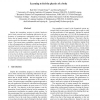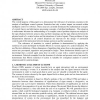141 search results - page 11 / 29 » Intelligent learning and control of autonomous robotic agent... |
CIMCA
2005
IEEE
14 years 2 months ago
2005
IEEE
Despite the tremendous progress in robotic hardware and in both sensorial and computing efficiencies the performance of contemporary autonomous robots is still far below that of ...
SMC
2007
IEEE
14 years 2 months ago
2007
IEEE
– In this paper, we present a hierarchical methodology that learns new walking gaits autonomously while operating in an uncharted environment, such as on the Mars planetary surfa...
IFIP
2001
Springer
14 years 1 months ago
2001
Springer
The overall purpose of this paper is to demonstrate the relevance of semiotics concepts to the analysis of intelligent control systems. Semiotics has only a minor impact on resear...
CEC
2009
IEEE
14 years 3 months ago
2009
IEEE
— It is advantageous for colony robots to be autonomous and self-sufficient. This requires them to perform their duties while maintaining enough energy to operate. Previously, we...
ECP
1997
Springer
14 years 22 days ago
1997
Springer
Systems that act autonomously in the environment have to be able to integrate three basic behaviors: planning, execution, and learning. Planning involves describing a set of action...


